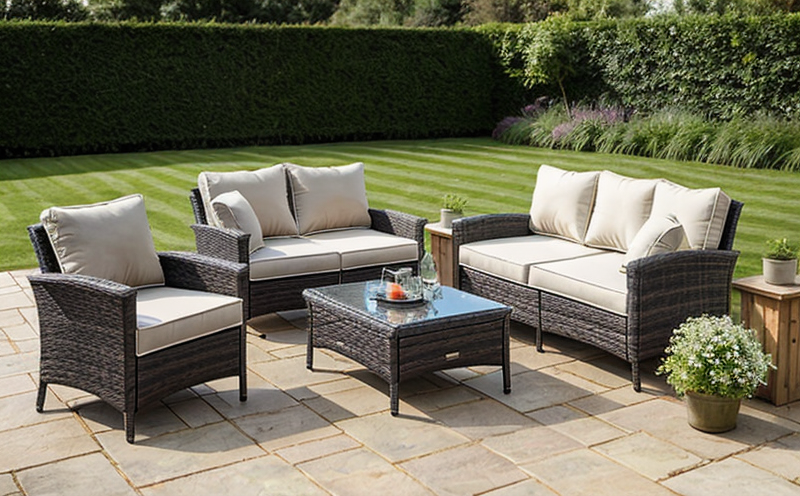BS EN 581-2 Outdoor Chairs Mechanical Strength and Durability Testing
The BS EN 581-2 standard is designed to ensure that outdoor furniture, including chairs, meets the necessary mechanical strength and durability requirements for use in challenging outdoor conditions. This test evaluates how well a product withstands the rigors of weather exposure, heavy usage, and environmental stresses.
Outdoor chair manufacturers are required to demonstrate compliance with this standard through rigorous testing procedures. The test involves placing chairs under various loading conditions to simulate real-world use scenarios. These tests help verify that the furniture will maintain its structural integrity over time, even when subjected to harsh outdoor environments such as rain, wind, and extreme temperatures.
Compliance with BS EN 581-2 is crucial for manufacturers aiming to ensure their products meet or exceed industry standards. This ensures a safer product that can be trusted by end-users. Additionally, compliance supports the marketing of these products in countries where this standard is recognized and required.
The testing process typically involves several stages. First, chairs are subjected to static loading tests, which measure how much weight they can support without failing. Following this, dynamic loading tests assess the resilience of the furniture under more realistic conditions that simulate everyday use, including impacts from people sitting down and getting up.
Environmental exposure testing is another critical component of BS EN 581-2. This involves placing chairs outdoors for extended periods to observe how they age and degrade over time. Environmental factors such as UV light, humidity, temperature fluctuations, and salt spray are all considered in this phase of the test.
Once testing is complete, detailed reports are generated that document each aspect of the tests conducted. These reports provide a comprehensive overview of the chair's performance under various conditions, highlighting any areas where improvements may be necessary for future iterations of the product.
The results from these tests play a significant role in quality control and assurance processes within manufacturing facilities. They also serve as important data points when negotiating with suppliers or sourcing new materials for production runs.
By adhering to BS EN 581-2, manufacturers not only enhance their product's performance but also contribute positively towards sustainability efforts by creating durable products that last longer and require less frequent replacement. This reduces waste in landfills while providing consumers with reliable furniture options.
| Outdoor Furniture Manufacturer | Supplier of Outdoor Furniture Components | Retailer Selling Outdoor Furniture | Regulatory Bodies Monitoring Outdoor Furniture Compliance |
|---|---|---|---|
| Manufacturing facilities producing outdoor chairs. | Companies supplying materials like metal, wood, or plastic to manufacturers. | Sellers who import and sell outdoor furniture in compliance with international standards. | Bodies enforcing product safety regulations such as the European Commission or individual country agencies. |
Industry Applications
The application of BS EN 581-2 extends beyond just manufacturers; it encompasses suppliers, retailers, and regulatory bodies involved in the outdoor furniture industry. For manufacturers, compliance ensures they meet stringent quality requirements set by international standards.
Suppliers benefit from this standard as well since it drives demand for higher-quality components used in production processes. Retailers find value in selling products that have been proven to last longer and perform better under rigorous testing conditions.
Regulatory bodies use these tests results when evaluating whether imported or locally produced outdoor furniture complies with local laws regarding safety and durability. This helps protect consumers from potentially harmful or poorly constructed items.
Quality and Reliability Assurance
Implementing BS EN 581-2 provides numerous benefits for both manufacturers and end-users. From a manufacturer's perspective, it offers peace of mind knowing that their products are being tested against recognized international standards.
This standard helps build trust with consumers who know they are purchasing furniture designed to last longer than average alternatives. For suppliers, compliance opens up opportunities for business growth by attracting more clients seeking reliable outdoor seating solutions.
On a broader scale, adherence to this standard contributes positively towards sustainability efforts within the industry. By producing durable products that don't need frequent replacements, manufacturers help reduce waste and promote responsible resource utilization practices.
International Acceptance and Recognition
The BS EN 581-2 standard enjoys widespread acceptance across Europe due to its rigorous testing protocols and emphasis on real-world performance metrics. Many countries outside of Europe have adopted similar standards based on ISO or ASTM guidelines, further enhancing the global relevance of this particular test.
For businesses operating internationally, ensuring compliance with BS EN 581-2 can open doors to new markets where there is a growing demand for high-quality outdoor furniture. It also simplifies export processes by aligning requirements with those set by importing nations.
Recognition of this standard among key stakeholders such as regulatory bodies, buyers, and end-users strengthens the credibility of products meeting its criteria. This recognition fosters confidence in brands committed to maintaining high standards throughout their supply chains.





